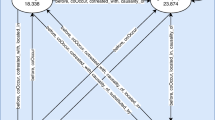Abstract
Temporal abstraction has been known as a powerful approach of data abstraction by converting temporal data into interval with abstracted values including trends and states. Most temporal abstraction methods, however, has been developed for regular temporal data, and they cannot be used when temporal data are collected irregularly. In this paper we introduced a temporal abstraction approach to irregular temporal data inspired from a real-life application of a large database in hepatitis domain.
Preview
Unable to display preview. Download preview PDF.
Similar content being viewed by others
References
Bellazzi, R., Larizza, C., Magni, P., Monntani, S., Stefanelli, M.: Intelligent analysis of clinic time series: An application in the diabetes mellitus domain. Artificial Intelligence in Medicine 20, 37–57 (2000)
Haimowitz, I.J., Kohane, I.S.: Managing temporal worlds for medical trend diagnosis. Artificial Intelligence in Medicine 8(3), 299–321 (1996)
Ho, T.B., Nguyen, T.D., Nguyen, D.D., Kawasaki, S.: Visualization Support for User-Centered Model Selection in Knowledge Discovery and Data Mining. International Journal of Artificial Intelligence Tools 10(4), 691–713 (2001)
Horn, W., Miksch, S., Egghart, G., Popow, C., Paky, F.: Effective data validation of high-frequency data: time-point-, time-interval-, and trend-based methods. Computer in Biology and Medicine, Special Issue: Time-Oriented Systems in Medicine 27(5), 389–409 (1997)
Larizza, C., Bellazzi, R., Riva, A.: Temporal abstractions for diabetic patients management, Artificial Intelligence in Medicine. In: Keravnou, E., et al. (eds.) Proc. AIME 1997, pp. 319–330 (1997)
Lavrac, N., Keravnou, E., Zupan, B.: Intelligent Data Analysis in Medicine and Pharmacology. Kluwer, Dordrecht (1997)
Motoda, H.: Active Mining: New directions of data mining. IOS Press, Amsterdam (2002)
Shahar, Y., Musen, M.A.: Knowledge-based temporal abstraction in clinical domains. Artificial Intelligence in Medicine 8, 267–298 (1997)
Author information
Authors and Affiliations
Editor information
Editors and Affiliations
Rights and permissions
Copyright information
© 2003 Springer-Verlag Berlin Heidelberg
About this paper
Cite this paper
Nguyen, T.D., Kawasaki, S., Ho, T.B. (2003). Discovery of Trends and States in Irregular Medical Temporal Data. In: Grieser, G., Tanaka, Y., Yamamoto, A. (eds) Discovery Science. DS 2003. Lecture Notes in Computer Science(), vol 2843. Springer, Berlin, Heidelberg. https://doi.org/10.1007/978-3-540-39644-4_40
Download citation
DOI: https://doi.org/10.1007/978-3-540-39644-4_40
Publisher Name: Springer, Berlin, Heidelberg
Print ISBN: 978-3-540-20293-6
Online ISBN: 978-3-540-39644-4
eBook Packages: Springer Book Archive




